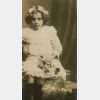| Profile | Posted by | Options | Post Date |

|
PollyS
|
Report
|
4 Jul 2010 10:12 |
|
Hypocracy regarding those who have viewed the 1911 census is totally irrelevant in my opinion. The discussion here is not about whether or not people 'benefit' from access but about whether it is acceptable to renege on promises made to us and our families.
If trust is so willingly broken for the sake of people's thirst for a hobby then it may well make people think more carefully in the furture about the truthfulness of the information they are being told to give.
|

|
Joy
|
Report
|
4 Jul 2010 10:17 |
|
No, Jonesey, I do not; once it was released, it could not be avoided.
http://www.1911census.org.uk/1921.htm
The 1921 Census was taken on the night of Sunday 19th June 1921.
It had been originally planned that the census would be taken on the night of 24th April 1921 but this was delayed because of strikes.
Extra questions asked over the 1911 census included
whether a marriage has been dissolved by divorce
where each person works
the industry within which someone works
The question introduced in 1911 about the number of children was dropped, the reason given was that the results from the previous census had not yet been tabulated. Also the question about blindness, deafness or dumbness were removed on the grounds that the answers given in the previous census were unreliable and also parents had objected to giving this information about their children.
Accessing the 1921 Census .... when will the 1921 Census be released?
The ruling by the Information Commissioner that resulted in the 1911 census being opened early does not apply to the 1921 census because, unlike the 1911 census, the 1921 census was conducted under the 1920 Census Act, which is still in force and which contains a statutory prohibition on disclosure.
The stated government position from the ONS is "its intention to release the entirety of the 1921 census returns in 2022, in accordance with the non-statutory '100 year rule' which was adopted to reflect this undertaking of confidentiality".
|

|
Joy
|
Report
|
4 Jul 2010 10:32 |
|
http://www.ffhs.org.uk/news/news061213.php
Please note that Government policy is that the 1921 and subsequent censuses should remain closed for 100 years. Unlike the 1911 census, the 1921 census was conducted under the 1920 Census Act, which is still in force and which contains a statutory prohibition on disclosure. This means that if any Freedom Of Information Act (FOI) requests are received for the 1921 census, the exemption found in S44 of the FOI Act will be invoked to maintain census confidentiality. (The 1921 census is not held by TNA and remains, like all subsequent censuses, in the custody of the Office for National Statistics (ONS).
|

|
Jill 2011 (aka Warrior Princess of Cilla!)
|
Report
|
4 Jul 2010 15:49 |
|
I'm on the fence on this one.
The promise was made at the time (I believe) that info would not be released for 100 years. The people to whom that promise was made are - in the main - deceased as it would have been the adults at the time being happy (or not) with that promise. The babies or children - who are the only likely survivors of the 1921 - would not have been involved or asked. I know there is a daft logic to my argument but hey!
I was pleased the 1911 was released early as was able to share the info I found with my MiL - now 89. She was delighted with it. If I'd had to wait until 1911 or after she may not be around then ... I know also that she would be happy to see anything on her parents and siblings from the 1921 if that was released early.
However, if we made a promise we should stick to it I suppose ...
Jill
|

|
SylviaInCanada
|
Report
|
4 Jul 2010 20:27 |
|
Jonesey
I did indeed look at and use the 1911, and I still do the free search to help others.
I discovered that my maternal gt grandfather was living with his daughter and my mother .... something I did not know previously
HOWEVER .................. I never signed that petition to release the 1911information early. I was actually not that much in favour of its release
BUT once it was released, then I would have been stupid not to take advantage of it wouldn't I?
The early release of the 1911 is making one heck of a lot of money, especially for PRIVATE companies
It might be interesting to know how much money the British government itself made by selling the transcription rights to that company.
In Canada, we face something that I don't think you in the UK face
.............. that is demands for compensation for things that happened 50, 90, 100, 200 years ago.
These events range from abuse in religiousresidential schools, racism events (such as East Asian (mainly Sikhs) not being allowed to land in Canada in the 1920s, or Japanese and Japanese-Canadians being put in internment camps during WW2), forced sterilization of both men and women in the 1920s to 1950s, First Nations land rights, etc etc
A few of the cases have also involved the RELEASE of private information by government departments
The precedence is there ...................................... for someone who is on the 1921 census, even as baby, to sue OR for a younger person to sue, claiming that the release of information before the 100 years is up breaks the 1920 Census Act.
OOOOOOOOOOOOOH .... wouldn't that be interesting??????????
sylvia
|

|
Madmeg
|
Report
|
5 Jul 2010 02:15 |
|
The 1921 census would be unique in that it would be the first after the Great War, when lots of our relatives died or were displaced, and lots of widowed women married for a second time and got on with their lives after experiencing great trauma. I'd like to know about them sooner rather than later.
I cannot see what is to be gained by not releasing census information from the past. Whether it be 1921 or 2001. Much of it is released to companies all over the world, for a fee. So they already have access to it. Polictical parties routinely acquire CDs or databases of the electoral rolls for their area at every election, so they too have a form of census available to them. We can also access the electoral roll records easily. So there is loads of stuff being published that we are not even awae of.
I support the move to release the 1921 census, as being the first afer the Great War. It could be the most interesting census we have ever had access to.
|

|
Samantha
|
Report
|
5 Jul 2010 04:47 |
|
I think if one takes the sensitivity rule to its fullest, then census information should never be released. It's more than possible than someone on the 1921 census will be alive in 2022 - what do we do then? Defer release until every one on the census is dead?
I dare say when the 1901 census was released under the 100 year rule, there were people on it still alive then. At the end of the day, no legislation promised to keep this information private for ever. Therefore, whether it's 90 years or 100 years, confidentiality is limited.
That said, I don't agree with selling the early release as a money-spinner. While that might be the only language politicians understand, I don't find that a compelling reason.
I think we should be far more worried about what private information the government has on us *now* and is being used to invade our privacy.
|

|
TootyFruity
|
Report
|
5 Jul 2010 07:46 |
|
In1921 we would have also had the Spanish Flu Pandemic which killed approximately 3 % of the world population
However, I know a family secret will be revealed which will horrify my aunt and feel many others may have secrets they wish to keep for as long as possible.
This asside by continually pushing the envelope we are laying the ground work to dilute the accuracy for future census's as promises made to us can also not be upheld.
If this promise is broken, which other promises are we will to sacrifice?
|

|
Mick in the Sticks
|
Report
|
5 Jul 2010 08:08 |
|
I have studied genealogy since the early 1980's. It was not until the LDS released their indexed only version of the 1881 census, (no images), that any form of census became commercially availiable. I still have my original copy of 40 CD's. Although censi prior to 1881 could be viewed as the 100 year rule had passed it was not until later years that the images became availiable on CD. Even then they were not indexed and research was a laborious case of going through thousands of images extracting any useful information.
The thought at the time was wait until the 1891 census was released to eventually be followed by similar thoughts about the 1901 census. Well, they eventually were released after the 100 year rule had passed and all anyone could do was have patience and wait. Another long wait ensued for the 1911 census and the identical debate is now starting to take place for the 1921 census. The simple truth is that like all the previous censi, people will probably have to learn to have patience and wait.
I expect when the 1921 census is eventually released there will again be probable cries of outrage over the price similar to those when the 1911 census was released. In an earlier contribution I posed the question of why we should should have to pay for something that taxes had already paid for and was public information. I am still strongly of that opinion.
I do appeciate that there will be costs in copying and indexing the 1921 census, however were these same costs not present for the 1901 and earlier censi? I personally do not use the 1911 census simply because I cannot afford it. The costs of all earlier censi that I use have been absorbed as part of an annual membership fee I pay to Ancestry. I did treat myself to a £25 package as a Christmas present when it was first released but found in reality that it was only of limited use.
I found that now all BMD's have been indexed, it does not take too much research by cross referencing the BMD's to work out family connections so to me the 1911 is not that important. By using this method I have in effect already by-passed the 1921 census and can if I wish work out most family relationships into the 2000's. Yearly electoral rolls and telephone directories help fill out address information.
Perhaps if more people used this method instead of wanting everthing presented before them we will not be faced with the high cost for only one census caused by a bidding war.
Michael
|

|
Guy
|
Report
|
27 Jul 2010 17:56 |
|
The replies to this thread have raised a number of comments that I would like to address.
I agree the taking of and archiving of the census is already financed by taxes unfortunately that does not cover the provision of access to the census.
There are a number of ways access could be arranged I will mention just 3.
1. As in the access could be by personal visit to the archive that stored the census schedules by means of viewing the original schedules.
This would be cheap but the schedules would quickly suffer from the number of repeated uses and would soon disintegrate. That is the reason census were microfilmed in the past.
The advantage of this to researchers is local researchers get free access those who live further away may have to pay considerable amounts to access the records.
2. The schedules could be microfilmed or digitised and made available at various archives that were prepared to pay for the films or digital images.
The disadvantage of this is it is costly for the individual archives and inconvenient to researchers.
As above this could be free at the point of use but could mean long journeys and expense for those who live outside the area.
3. The schedules could be digitised and made available online.
This would be expensive for the holding archive and could be paid for by increased taxation or it could as with other census be paid for by the researchers who access the records.
Possibly the fairest option contract the hosting to third party companies who would provide reasonably cheap access to all in their homes in any location.
Privacy, I will deal with the 100 year rule in a second post but consider this there is no real private information on the 1921 census.
The questions asked were -
Name & Surname, Relationship to Head, Age, Sex, Married or Orphaned, Birthplace, Nationality, School, Occupation, Employment, Place of work, Total Children Under 15, Ages of Children
In 1921 the answers to those would be public knowledge in the locality.
Cheers
Guy
|

|
Guy
|
Report
|
27 Jul 2010 18:34 |
|
The 100 year Rule.
Many people are confused by the 100 year rule and imagine the public were promised that census returns would be closed for 100 years, the truth is very different.
The first census that included the promise the census returns would be closed for 100 years was the 1981 census.
The then Registrar General (Len Cook) made an unauthorised pledge that the census would be closed a pledge he later had to admit in a letter to the House of Commons dated 14 March 2005 he had no authority to give.
The 100 year rule itself was introduced in 1966 by the Lord Chancellor's Instrument No. 12, - 45 years after the 1921 census.
Consider also that the 1841 and 1851 records for England and Wales were both released in 1912.
Only six out of the 15 pre-1910 United Kingdom censuses have been closed for 100 years. The details of nine out of 15 have been released after less than 90 years. The average closure period for censuses in Britain is 80 years.
The newspapers of the day carried stories of details given in the earlier census promoting the perception that census were open to those who wished to view them
I would be very surprised if anyone who participated in that census really believed that their return would be held for exactly 100 years and not a day less.
The 1921 Census schedule carried the words "STRICTLY CONFIDENTIAL"
However it should be noted that the 1911 census carried the following words
"The contents of the Schedule will be treated as strictly confidential".
The following also appeared on the reverse of the Schedule:
"The contents of the Schedule will be treated as confidential. Strict care will be taken that no information is disclosed with regard to individual persons. The returns are not to be used for proof of age, as in connection with Old Age Pensions, or for any other purpose than the preparation of Statistical Tables".
As you can see the 1911 census, which was released early carried stronger wording than the 1921 census.
It should also be remembered that the 1920 Census Act as amended by the Census (Confidentiality) Act of 1991 prevents access to any census taken under the Act from ever being released.
Note from ever being released not in 100 years not in 1000 years not ever. There is not time limit on the prohibition.
That is why a change of law is required.
There will have to be a change of law either now or prior to 2022 to allow the census to be released.
That change of law may as well take place at this time when the government are willing to listen and the country desperately needs the revenues that could be raised.
Cheers
Guy
|

|
Joy
|
Report
|
27 Jul 2010 19:21 |
|
I have read comments from you elsewhere, Guy, and asked you a question on Family Tree Forum:
"As a matter of interest, Guy, why the rush from a personal point of view? Why would you not be content to wait?
Is it because the 1931 census documents were destroyed in a fire and the 1941 was not taken and, therefore, it may be the last one to be released in your and my lifetime?"
|

|
Peterkinz
|
Report
|
28 Jul 2010 05:03 |
|
Anyone over 10 years old at the time of the 1921 census would have been recorded in the 1911 one - therefore their details as far as name, date/place of birth, parents, siblings etc. are all in the public domain.
For those born between 1911 and 1921 - most of the details can already be worked out/guessed at/verified with certificates and other data already in the public domain. The 1921 census then becomes a very effective index - so why not release it.
I think we are too paranoid about "privacy" - I can find every detail about myself by googling if I want to.......what is the point of hiding my children's names on my family tree - you can find them quickly enough with an ancestry subscription.
Peter
|

|
Guy
|
Report
|
28 Jul 2010 08:12 |
|
Joy (AKA Maid Marion & Joy Kentish Maid), there is no mad rush.
Having read, and having taken legal opinion of the legislation there needs to be a change in the law before any census taken after 1920 may be released.
The Census Act 1920 as amended by the Census (Confidentiality) Act 1991 excludes the release of any census taken under the 1920 Act ever.
I cannot stress this too much. It is at present illegal to ever release any census, not in 100 years not in 1000 years.
There has to be a change in the law to allow a release.
That change in the law may as well be now when the government is receptive to change and the country desperately needs the revenue such a release could bring.
Cheers
Guy
|

|
Joy
|
Report
|
28 Jul 2010 13:39 |
|
Thank you for responding to my question this time.
I am still of the same mind as OC, and am totally against early release.
|

|
Contrary Mary
|
Report
|
28 Jul 2010 17:06 |
|
Guy
I have a question that you may be able to answer for me?
Was it a legal requirement for the householder to fill in the 1921 (or any of the censuses), under pain of death.......well okay a hefty fine lol ......for not doing so?
Mary
|

|
Guy
|
Report
|
28 Jul 2010 19:22 |
|
Contrary Mary it all depends on what you regard as "under pain of death.......well okay a hefty fine lol ......for not doing so?”
There was a higher punishment for not registering a birth or death, which the public can see from the day of registration, than for not completing the census.
The Census Act 1920 allows for fine not exceeding ten pounds.
However the Births and Deaths Registration Act, 1874 shows the fine for wilfully giving any false answer to any question put to him by a registrar relating to the particulars required to be registered concerning any birth or death, or wilfully gives to a registrar any false information concerning any birth or death was on summary conviction to a penalty not exceeding ten pounds, and on conviction on indictment to fine to imprisonment with or without hard labour for a term not exceeding two years, or to penal servitude for a term not exceeding seven years.
So you can see that not answering a census question was not particularly onerous
Whereas not registering a birth or death could get you two years hard labour or seven years penal servitude.
Rather puts a different slant on the penalty for not completing the census.
Cheers
Guy
|

|
Contrary Mary
|
Report
|
28 Jul 2010 19:54 |
|
Thanks Guy.
For some reason I had it in my mind that on the last census I filled in it said to not do so could be punishable by a fine of up to £1000........I must be confused with something else........not difficult for me! LOL.
Mary
|

|
Guy
|
Report
|
28 Jul 2010 20:02 |
|
Michael wrote “I have studied genealogy since the early 1980's. It was not until the LDS released their indexed only version of the 1881 census, (no images), that any form of census became commercially availiable. I still have my original copy of 40 CD's. Although censi prior to 1881 could be viewed as the 100 year rule had passed it was not until later years that the images became availiable on CD. Even then they were not indexed and research was a laborious case of going through thousands of images extracting any useful information.”
Not quite correct.
It was possible to purchase census on microfilm and/or microfiche prior to the release of the 1881 census by the LDS.
I have a cabinet of microfiche and film of census I purchased over the years for the Bottesford area of Leicester.
Due to costs involved most individuals restricted themselves to only purchasing census for the district they were interested in.
It should also be pointed out that before the Freedom of Information Act in 2000 it was possible to obtain details of the occupants of an address from unreleased census on payment of a fee.
As for the costs involved in digitising the census.
Prior to the 1911 census the enumerator completed returns and the individual schedules were destroyed. The 1911 census was different the schedules were archived and this meant a vast number of extra records to be scanned. The costs rose considerably.
I should also add that any commercial company could, since November last year, if they wished purchase the 1911 direct from the National Archives. However only BrightSolid have had the courage to do so, it is nothing to do with a bidding war.
Cheers
Guy
|

|
Joy
|
Report
|
28 Jul 2010 23:26 |
|
Do you know the views, Guy, of the Federation of Family History Societies?
Incidentally, the ancestry site is putting the 1911 enumerators books on its site.
From six months after Bright Solid had had the 1911 census online, other companies could apply to transcribe it and put it online.
|

